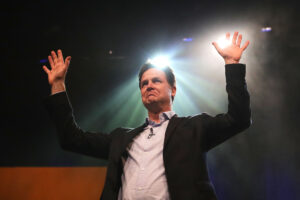In almost all respects, life for Reform UK’s “honorary president” couldn’t be any better at the moment. About to turn 60, Nigel Farage is earning more than ever, drinking less (a third of what he used to, he told me), and still gets to cause mischief. All that he ever hoped for has seemingly come to pass. Brexit has happened. Freedom of movement has ended. And he’s friends with the favourite to be the next President of the United States. Why risk it all by flirting with a return to frontline politics?
But when you’re with him it’s hard to avoid the sense that, somewhere not far from the surface, a thought is running through his mind, drawing his attention, pulling at his imagination: what if?
When we meet in Westminster, he describes how he was out that morning walking his dogs in the woods near his home in Downe, a tiny little village nestled in that strange twilight between the sprawl of London and the wooded folds of Kent. There, he tells me, with genuine excitement, he spotted the first bluebells of spring.
The annual bloom of spring caused Farage’s political hero, Enoch Powell, “sheer, almost physical agony”, because it reminded him of the relentless passage of time. “The succession of the seasons is like a recurrent inescapable catastrophe, which sweeps away what is young and beautiful, and what is beautiful because it is young.” It is fair to say that Farage does not brood on such thoughts; the bluebells, he thinks, are pretty.
For Farage is an instinctive Powellite, not a darkly poetic and intellectual one. Spring does not evoke terrible reflections on mortality. Yet, what Farage does share with Powell is an idea of a threat connected to the landscape where he was born and still lives, not far from where Charles Darwin made his home. “The country is extraordinarily rural and quiet with narrow lanes and high hedges and hardly any ruts,” wrote Darwin in 1842. “It is really surprising to think London is only 16 miles off.”
Venture to Downe today and you’d think the same. The place remains wrapped in green, surrounded by fields, meadows, country lanes and woods separating it from the creep of Thirties suburbia just around the corner. I chanced upon it during the pandemic, while searching for new woodland walks for the family. From where I live in Lewisham, seemingly as far from Downe as is possible to get, it’s a short drive through the suburbia of South East London to a place called Coney Hall on the very outer edges of Bromley. Here, we began our plod through Well Wood, assuming we had not left the city. And then, suddenly, we emerged through the trees to see farms and fields. This was the end of London, sudden and total — and the beginning of Kent rolling out before us, well within the M25. On the other side of the fields was Downe and the land of Nigel Farage.
“When I was born, Downe was in Kent County Council,” Farage tells me. “But then Greater London extended and just took us in.” And so, today, the country lanes of Farageland are dotted with Sadiq Khan’s Ulez cameras. “Well, they won’t be there for very long,” says Farage, laughing. Vigilante justice will see to that.
Such are the passions over Ulez that Farage believes Downe will try to secede from London to rejoin Kent. “Nobody in those twin villages of Downe and Cudham believe they live in London,” Farage explains. “It just feels wrong. At the next local elections, there will be a candidate elected to take TN14 and TN16 out of Greater London. Separatism from Greater London is coming, believe you me.” The next elections for Bromley Borough Council come in 2026. May’s elections for London Mayor and Assembly may just be the start of the suburban rebellion.
Separatism from London. What a remarkable thought. Was it even possible? Can places really just secede from the cities to which they are attached? And to what end? To avoid new taxes? Well, it’s been done before. “They will win by a mile,” Farage is certain. “It’s going to happen. We will elect councillors to leave Greater London.” In fact, Farage believes the whole of Bromley could vote to leave, becoming a unitary authority instead. “You’re taxing the poor and the elderly. Everybody thinks it’s monstrous. Even those with nice, smart cars.”
For many, this sort of separatism represents a kind of rebellion against modernity, a response to the slow but inevitable creep of modern city life over Farage’s rural idyll, much as Powell regarded the passage of time through the seasons. Separatism is the tool to stop the inevitable, just as it was supposed to stop Europe’s spread over Britain. In a sense, then, Faragism all comes back to Downe. His politics are based on the instinct, as Roger Scruton put it, “that what has been lost can also be recaptured — not necessarily as it was when it first slipped from our grasp, but as it will be when consciously regained and remodelled, to reward us for all the toil of separation…”
Farage himself does not entirely demur from this explanation. “What shaped me more than anything was growing up in a village where everyone knew everyone,” he tells me. “I grew up with a sense of community where class was irrelevant. There was a genuine sense of being, of identity. I think that’s what we’re losing in our big cities.” Downe, to Farage, is an extension of his family — and the nation should act like a giant extension of Downe. “My political beliefs are very much based on where I grew up,” he says.
Farage insists this does not mean he is running from modern life. “I don’t mind modernity,” he says. “What I think is awful is that people who live in the big cities now don’t even know the names of their neighbours or might not even speak the same language. That’s how I view that.”
In one sense, at least, Farage’s home is threatened by London. For those who prioritise house-building over conservation, the area around Downe is among the most obvious development opportunities in Britain. Here is a land of fields comfortably within the M25, close to Bromley, Orpington, Croydon and Sevenoaks. It is a land fit for Deano. For Farage, such talk is appalling: the inevitable consequence of immigration, as he sees it. “It’s why the immigration issue will be the dominant issue for the next 10 years in British politics.” But what would he do if this happened? “I’ll just move,” he says. “Between Sevenoaks and Tunbridge Wells — whatever it takes.”
While it is evidently true that Faragism represents a battle against this vision of modernity — against the bureaucrats in Whitehall, City Hall or Brussels imposing their control — it is better understood, I think, as a product of modernity. Faragism is a reaction to and a reflection of modern life. The increase in population requires more homes to be built, which does threaten existing landscapes like those around Downe. But the planning laws which stop these houses being built are a core reason why Britain is becoming both a poor and expensive place to live — the elemental source of the current disenchantment threatening to sweep the Conservative Party from power and perhaps even from existence.
It is this sense of a coming revolution that is pulling Farage back to the flame of politics. Will he return to frontline politics? “I honestly don’t know,” he replies, unconvincingly. “Life for me is pretty good. I’ve got a job that I love… I’m earning very good money, which I haven’t done for 30 years. The kids are all grown up… getting back into politics means giving all that up.” And then again he adds: “But maybe, just maybe.”
But if life is so good, why the maybe? “There’s a historic opportunity to really change things,” he says. “I edge towards thinking that may be the case.” What’s holding him back isn’t actually the money, but the risk of defeat. “I still feel very burnt by 2015,” Farage explains. “Four million votes and one seat.” The general election of 2015 seemed to be the moment the wave had finally crested for Farage. The year before, Ukip had won the European elections. It was now or never to finally enter parliament — but he ended up 1,800 votes short, losing to the former Ukip deputy leader Craig Mackinlay. After the election, Farage quit as leader and prepared for retirement. But then modernity intervened. David Cameron had won, unexpectedly, and had to make good on his promise to hold a referendum. Would he really risk it all again for the same result?
Over the past few weeks, there has been much speculation Farage might be tempted to follow Mackinlay’s path into the Tories. Yet, he is not only honorary president of Reform, but majority shareholder — owner in fact. So, if he stood, would it be for Reform? “Of course. Oh absolutely.” Yet, the idea of him leading the Tories isn’t entirely fanciful. “If Reform do well and get a lot of votes and a reasonable representation of seats — and the Tories do very badly — then something very big is coming afterwards,” he explains.
Like what? Look at Canada, he says. In 1993, the leader of Canada’s Progressive Conservative Party Brian Mulroney was replaced as prime minister a few months before the general election. The new leader Kim Campbell then led the party — which had been in power for the previous nine years — to an astonishing defeat, losing all but two of the party’s seats. They would never be a major political force again.
In the Progressive Conservative Party’s place came a new political force also called Reform. In time, Reform changed its name to the Canadian Alliance to broaden its appeal, and then formally merged with the old Progressive Conservatives to become the Conservative Party: Stephen Harper, Canada’s Conservative prime minister between 2006 and 2015, was also one of Reform’s founders. “Reform basically reverse took over the Conservatives and Stephen Harper became Prime Minister,” Farage explains. “If there was a model, it’s Canada. If it’s doable, I don’t know. We’ll see.”
At Powell’s funeral, his daughter read A.E. Housman’s “The Loveliest of Trees” from A Shropshire Lad. Not just a paean to beauty, it’s another reflection on mortality. “Now, of my threescore years and ten, twenty will not come again,” he writes; “And take from seventy springs a score, It only leaves me fifty more.”
On Wednesday, Nigel Farage will have seen out threescore years of his time on earth, all of them in Downe. As he traipses through the woodlands of his childhood, dogs in tow, cigarette in hand, a flicker of mortality may well intrude on his thoughts too. Will he get another chance like this? The Tory party’s problems may be about to get even worse.
Disclaimer
Some of the posts we share are controversial and we do not necessarily agree with them in the whole extend. Sometimes we agree with the content or part of it but we do not agree with the narration or language. Nevertheless we find them somehow interesting, valuable and/or informative or we share them, because we strongly believe in freedom of speech, free press and journalism. We strongly encourage you to have a critical approach to all the content, do your own research and analysis to build your own opinion.
We would be glad to have your feedback.
Source: UnHerd Read the original article here: https://unherd.com/



